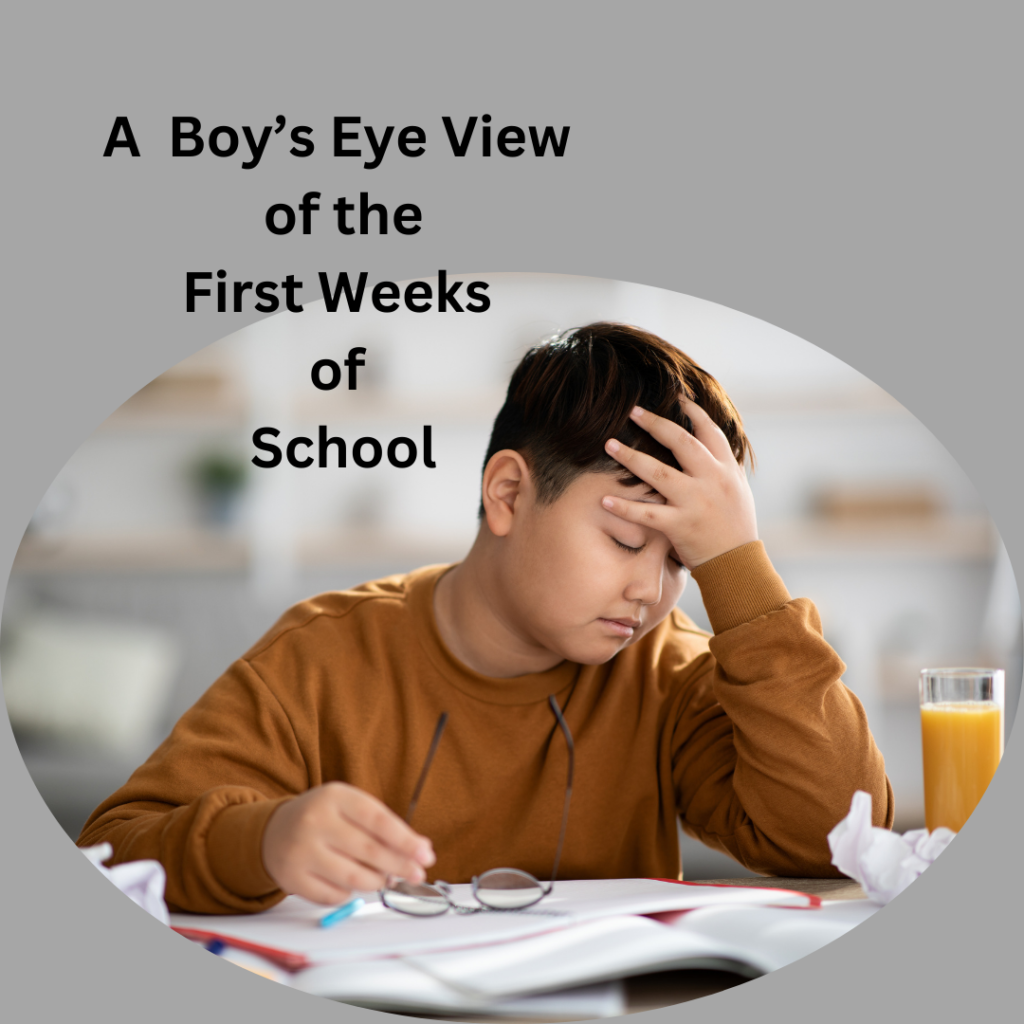I spoke with a third grade boy about his impression of the first weeks of school. The following are his observations:
It was hard sitting in a chari all day. I like to stand, but she kept telling me to sit down and sit still. That made it hard for me to listen to her. I was trying really hard to sit still.
She talked too much and I couldn’t understand some of the stuff she was teaching. It didn’t make sense to me.
I missed my friends and didn’t get a chance to talk to them except at recess that was too short.
I get thirsty during class, but I can’t bring in my water bottle.
Every time the teacher was talking about something I didn’t understand I talked to my friend and got in trouble. She made me miss recess.
We took tests and I missed everything. I am dumber than the rest of the kids in the class that got 100’s.
The teacher told my mom that I got all the problems wrong because I wasn’t listening. I was listening, but when I got lost I just felt like talking to my friend. I got into a lot of trouble.
Demystification
We spent time talking about his observations. It was clear they were insightful and needed to be shared with his teacher. Children need to advocate for themselves. He didn’t have any strategies for dealing with his feelings. He didn’t realize teachers form their own opinions of what they see and they can be incorrect and don’t realize it until a student explains what is going on. We reviewed every challenge he experiences and together we came up with a plan to deal with each of the issues.
- He’s going to talk to his teacher and share. He will say, “Ms. S. I want to listen better, and I can pay attention better if I can stand. If I can move to the back of the room and not be near my friends, I think I will be able to listen better.”
- He made mistakes on his work, because he didn’t realize he needed to read math word problems slowly. He is an avid reader and reads in phrases and he now sees that he can’t read word problems the same way. His plan is to ask to go outside so he can read the problems aloud three times before he answers them. The first time he will read the question he will be answering, then he will read the sentences to get an idea of the story. The third time, he will read it for the data.
- After looking at the problems he missed, it was clear there were terms he didn’t understand, so he guessed. He will ask the teacher to define the word, so he can have a better chance of getting a better result.
- He was encouraged to sit on the edge of the seat and lean forward while repeating what the teaching was saying in his mind to help him keep focus. He agreed to raise his hand when he doesn’t understand what the teacher is explaining.
- It was clear that the teacher misjudged his behavior. He was encouraged to ask to speak to the teacher and explain why he felt like talking when he was confused. Now he knows he needs to raise his hand.
He was like many bright children who compare themselves to others. He didn’t realize that even the brightest children make mistakes. It isn’t an indicator of intelligence. Testing at the beginning of the year is designed to determine what the students know and don’t know. The children come from different classes from the prior year and some come from different schools. Some may have been introduced to concepts that other teachers never covered. Judging their ability based on the pretests and first lessons is unfair. Helping them understand they are not defined by how they test. Many students are poor test takers because they lack strategies. Their egos are very fragile. Strategies will empower them. Asking teachers questions when they are confused will empower them .
Homework Solutions For Weary Students and Their Parents offers several scenarios and the words to use to get their needs met.
